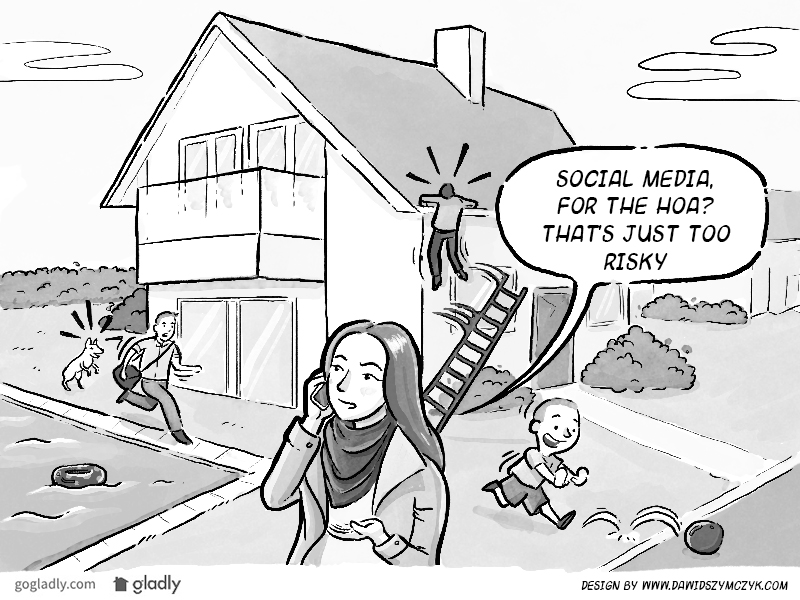Seems like pretty much everyone is using social media. Finding someone who’s not on Facebook, Twitter, or Instagram has become more the exception than the rule. Everyone from your grandma, to your kids, to big business is using it to connect to friends and followers. And if you ask me, that’s a good thing for your HOA.
But Isn’t it Too Risky?
The simple answer is: probably not. While HOA social media definitely has its rewards, there are many who perceive it as too big of a gamble. The drawbacks can be hard to quantify, but basically come down to the potential for misuse.
But There’s Good News, Too
Social media sites are created with an eye to limiting risk, absolving the governing organization — that’s you — of fault in the event of abuse. HOA social media should be no different.
If you follow a few guidelines, you can mitigate your liability and enjoy the benefits of social media without the worry.
So How do You Reduce Your Risk?
Here are some basic ways to protect your HOA from the potential legal pitfalls of social media.
- Use your Terms of Service — Each user must agree to these terms before signing up. Checking that “I agree” box legally requires them to adhere to the rules. Your Terms of Service shift the lion’s share of liability from your shoulders to your users, making them responsible for whatever they post. This reduces your risk for any inappropriate, wrongful, or offensive posts.
- Add an indemnification clause — This clause requires users to hold your HOA harmless in the event they feel they’ve been harmed using your site. It’s another way to shift legal responsibility to the user.
- Wave your “flag” — While an HOA can’t protect everyone from inappropriate posts, you can flag such submissions, and deny access to those who violate the Terms of Service. Flagging is a show of good faith that you’re doing what you can — within reason — to provide a pleasant experience for your users.
- Let users moderate — It’s the responsibility of each user — not the HOA — to report posts that violate the rules. This must be made clear to all users, with a readily available tool in place. However, the HOA must ensure that its board members and managers keep themselves in check. Since they are deemed part of the Association, any inappropriate posts they make could come back to bite you.
- Be insured — Director and Officer’s insurance can provide your HOA with peace of mind — and financial protection — in case the Association ever needs to defend an action.
- Take action — Your Association must fulfill their duties. For example, when a maintenance ticket comes in, the appropriate person is obligated to act on it. Your site should have a separate, always-monitored area for these and other action requests.
- Communicate clearly — Make sure all users understand what the social media site is for. If you don’t want the site to be the primary contact method between residents and the HOA, say so. Also be clear that adherence to the rules is required — or access will be denied.
The Bottom Line
From simple communication, to events, feedback and more, there’s nothing like social media for building a sense of community and keeping everyone up to date. As long as membership is verified and secure, and the above considerations are put in place, there’s no reason why social media can’t be remarkably useful in your HOA.
- The Pesky Nuances of the HOA Collection Policy - July 26, 2017
- HOA Legal Costs — Who’s Running Up The Bill? - October 19, 2016
- HOA Records — Save or Shred? - September 8, 2016



 Help
Help